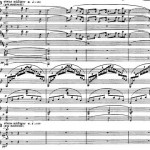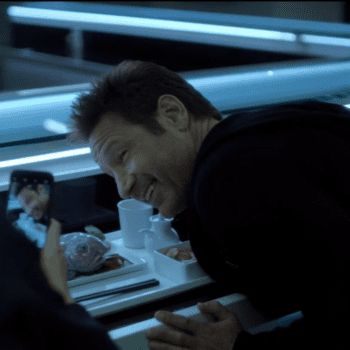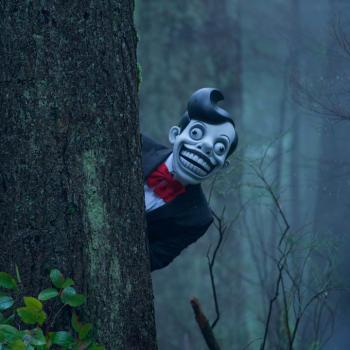The X-Files episode “The Lost Art of Forehead Sweat” embodies everything that was great about the classic series, in more ways than one. The classic series never took its conspiracy theories and aliens among us stories so seriously that it couldn’t poke fun at itself, and this episode does that in a way that updates it for the present day.
The episode begins in black and white, with a man saying he is not crazy to a cook at diner. He says that he has seen Martians, and when he says he just saw one, the cook says he isn’t looking at a window but a mirror. He then sees himself as a Martian in the mirror. At that moment the cook takes off his hat, revealing that he has satanic horns, and laughs. We later learn that this is supposed to be from Mulder’s favorite episode of The Twilight Zone, “The Lost Martian,” which he is then told never existed despite his having vivid memories of it.
The episode is comical throughout, but in a way that is deeply related to the show’s main themes and engages with its stories. Mulder comes in dressed as Sasquatch, saying that he went out “squatching” to get back to nature, and get away from a country that seems like it has gone insane. This is clearly doubly satirical – seeking bigfoot seems insane, but not in comparison to the state of our country.
Mulder then sees an X on his window, and a man who knows this secret rendezvous signal meets him at the appropriate location in the parking garage. The man claims that “they” are trying to erase him.
Having previously been told about “The Lost Martian,” the first episode of The Twilight Zone Mulder ever saw, which doesn’t exist and the videotape of which Mulder cannot find even though watching it was a definitive moment in Mulder’s life, we learn of similar instances related to Scully and then this other mysterious individual that is named Reggie. For Scully, it is Goop-O ABC that she remembers, which contained carcinogens but had been popular as a jello mix that separated into three separate layers. For Reggie it was Dr. Wuzzle books, and his recollection from childhood that the author’s name had been spelled differently. The episode explicitly mentions the online phenomenon of people who have a memory of a Shazam movie that never existed. The characters then debate whether this phenomenon is called the “Mandela Effect” or the “Mengele Effect.”
More than once characters mention Orwell’s statement in 1984, that the one who controls the past controls the future, although in tongue in cheek fashion one of them attributes it to H. G. Wells. The episode also mentions Holocaust denial and the effects of products and the interests of corporations in eliminating memories of those harmful effects of past products altogether. Reggie says at one point that “a conspiracy nut is right twice a day.” He adds that they are trying to make us think all conspiracy theories are crazy so we will ignore the genuine ones.
Eventually “they” is said to be “Dr. They,” who did pioneering work on memory manipulation. An online video hilariously claims that he was at the most recent presidential inauguration among the millions, and that he starred in the movie “Ka-Blaam.” The conversations veers into recovered memories, while Mulder thinks that memories that do not correspond to reality in this universe could originate from parallel universes.
The episode was already fun before Reggie Something tells Mulder and Scully that they used to be partners, and that he himself was the one who started the X Files. We are then treated to genuine scenes from earlier episodes depicting him involved in their cases.
Mulder meets with Dr. They, who says that nowadays what once would have been secrets can be made public, because no one knows what to believe any more. The aforementioned video about him is one that he made himself, but it presents the truth outlandishly so that no one will take it seriously. He quotes the wise words of the president, “Nobody knows for sure.”
Eventually Scully finds evidence that Reggie’s name is Reginald Murgatroid. He occupied a variety of jobs, and listened to them while working for NSA, so that is how he knew so much about them. Or is it?
Before two orderlies from Spotnitz Sanitarium (one of whom is equipped with a giant butterfly net) takes Reggie away, Mulder asks Reggie about their last case together. Reggie describes how a flying saucer landed, and a representative of an alliance of sentient beings informed them that they had been studying humans, and are building a wall to make sure that humans do not venture beyond our solar system. Lying, it turns out, is a trait unique to Earthlings. The alien uses words of Donald Trump, saying that we are not sending our best people out there, but are drug dealers and rapists, although he supposes some are also good people.
As Mulder puts it, the truth is we’re not alone in the universe, but nobody likes us.
The alien leaves behind a book with all the answers.
In the end, Mulder finds the TV episode that he remembers from his childhood – it simply wasn’t from The Twilight Zone, but rather a knock-off show, The Dusky Realm. They make some of the dessert mix, but Scully decides not to eat it, saying, “I want to remember how it was. I want to remember how it all was.”
Earlier in the episode, Dr. They contemplates what our era will eventually be called, and suggests perhaps PoCo for “Post-Conspiracy.” The episode is a fitting tribute to Rod Serling’s Twilight Zone which aimed to offer political critique of this very sort, albeit in more subtle ways. What better show to ask what it means to pursue the “truth” that is “out there” in a “post-truth era” than The X-Files? But it is still impressive that it manages to do it in an episode that is every bit as good as we remember the classic series to have been…
Let me share here a link to an article in Prospect magazine, “How The Internet Controls You,” which says:
Back in the 1980s, the cultural critic Neil Postman argued that our future would be bracketed by the nightmares of two British novelists: George Orwell, who thought we would be destroyed by the things we fear; and Aldous Huxley, who believed that our undoing would be the things that delighted us. With the aid of digital technology, we are managing to achieve both nightmares at once. We click compulsively on health scares and other anxieties while Big Brother watches, but are also distracted by dubious political claims that make us feel good and reinforce our prejudices.
Anxious Bench’s blog post about documenting the Holocaust also relates to the theme of cllective remembrance and forgetfulness.
Let me conclude with a link to an article in Inside Higher Ed about recent academic publications about the Trump presidency, which reminds us, “The quintessential American thinker Homer Simpson once made the profound observation that it takes two people to lie: one to lie and one to listen…”













